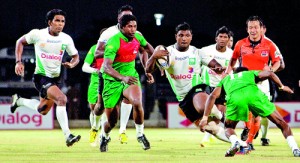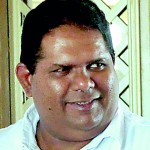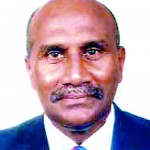Club loyalty, commercialism and other nitty-gritty’s of rugby administration

 Y.C Chang (Former national player and administrator) - In internationals we still haven’t made a mark. I know that we are getting to that point but there is no marked difference. In Sevens I think we have qualified for the Hong Kong Sevens. We will have to wait and see how that goes. We should include a couple of foreigners like all the other countries. Looking at school rugby I find it very interesting at the moment. It is fantastic to watch schools because their game play is completely different to that of the clubs. It is open, a run and pass game, which I have always advocated. But it is getting a little too competitive. The number of teams participating in the schedule is too much. The authorities themselves should curb that. The teachers know that and they are the finest administrators. In foreign countries, teachers are the administrators involved. So why can’t we do that? In the club game, I must say that credit to President Asanga Seneviratne, he has allowed foreigners to come in and we have seen a marked change in the game itself. Now they are moving the ball about from left to right and more options are being taken in midfield and it is quite interesting. That last game between Havelocks and Navy was the most interesting game I have seen this season. When I brought professionalism in the mid-80s there was a big hue and cry from within. I still managed to fight within and outside and I told the RFU to come and manage our affairs. At that time it was not expensive, we got the foreigners free and a season would cost you a couple of lakhs. But if you look at it today the club will have to raise between Rs.20 million to Rs.30 million to finish a season. I foresaw this ten years ago. I told the Havelocks Sports Club to start rethinking that you cannot sustain yourself, your gates are poor and your sponsors will be definitely thin out later on. Why I said that at that point of time was the type of game play they had was the most boring. It was just hit and fall, hit and fall. What Asanga Seneviratne will have to tackle as President of the Union is quite a mighty thing. Clubs will fall by the wayside because they cannot sustain themselves. We saw it in the CH&FC, and I can see it with CR and I can also see it with Havelocks. Havelocks is already going through the shivers. So what Asanga Seneviratne will do and how he will do it, I do not know. I also predicted that once the war is over the defence services will rise in the sport. Within a short space of time we saw Navy winning a trophy. This is going to continue because they have all the time, resources and manpower to do this, whereas Asanga Seneviratne will have to find the time to find the funds to get the clubs going. In terms of Sri Lankan refereeing, it going through a learning curve. We shouldn’t be learning at this point of time. The learning curve was over in the ‘60s, ‘70s,’80s. We had so much of participation between the player, referee and administrator. I don’t know how much of that is happening now. There are far too many complaints. The referees do not believe that the game of rugby is all about advantage. Advantage makes it really beautiful. |
 Rizly Ilyas (Secretary of the SLRFU) - When we look at school bodies going out on their own, it was never the idea of the Union to come and take it over and market it because we have enough of ‘A’ Division, ‘B’ Division and development work to do. We don’t want to take the schools and run them; it is not a task that can be done by us. When the schools had problems with the referees with disciplinary committee action to be taken they couldn’t handle it so we as the mother union were directed by the Ministry of Sports to take control of it. So we went in and intervened. Then we had an understanding that we could work a package and we could work together this year so we had dialogue with Susantha Mendis for about six months and we gave an outline of how the Union would want to run it. In the sense how we would want to get the funding part first from the current sponsor or for a new sponsor. I think they have achieved this by going from Rs. 15 million to Rs. 37 million or Rs. 50 million. We showed them that why we needed the money was to run the system properly. Now if you look at the Schools Seven-a-side tournament, there is no ice bath. When you do a seven-a-side school tournament there should be an ice bath because it is a seven-minute, hard game, the body temperature rises so much that the boys need it otherwise they get things like cramps and joint pains. We learnt this at the Carlton Sevens tournament when we saw the foreigners getting into the ice bath. When we worked with the physios, they said how it works on the muscles and the amino acids. So we showed these things to them and Susantha Mendis absorbed this. But they kept us in the dark and they negotiated with the sponsor, not telling us, but it’s okay. Then the other area which was bad was the School Association said they don’t come under the mother union, the SLRFU. So that was the reason that we didn’t allow them to take part in a tournament. And then they understood and I think the public came to understand that they needed to have guidance and permission from us because ultimately they had to go to his Excellency, the President, to ask him, because their was a request made by him to go ahead and give them permission to play. So that proved that without the mother union’s consent, no other body can play a tournament of rugby. Even beach rugby, touch rugby or anything, they have to inform us, because the IRB or ARFU they will directly write to us, they will not write to the Sports Ministry or schools or any other association. They will send all the regulations to us and anything has to come to us. At club level, standards have gone up and good management has come in. After Kandy dominated for years you now see Navy, Havelock’s, Upcountry Lions; CR getting better, Army is getting better, so the game is changing and it is going through a different revolution of playing at night. At the international level we have a very strong chance of competing. If we maintain ourselves in the A5 nations in 2019 we will have a very good chance if we go and qualify with the foreigners playing for our national team, like what the Philippines, Japan and Malaysia do. So I think when the rule (to include foreign players) is there we should use it. |
 Lasitha Gunaratne (Former national player and SLRFU Vice President) - Those days even the spectators had loyalty to their clubs. Today at the rate of the players crossing over from club to club the spectators are left clueless who to cheer for -- their favourite player or the club. In addition players those days were genuinely loyal to their clubs but with professionalism sneaking over, this attitude is not in existence anymore. The amount of crossovers taking place nowadays is really unhealthy for the game. This was not in existence during our days, unless there was a serious cause. This has injected frustration among rugby fans. The game was not as commercialized as it is today. Those who played the game during our days were loyal to their clubs, preserved the integrity, traditions and the values of the game, though the game was not as financially big as it is today. But I must admit that we played for the love of the game but were not commercially successful as players. The game has grown today where players have a value. But they have gone to the extent of disregarding all the traditional values of the sport, sometimes associating the wrong ends of the development. Some players have simply vanished as a result. Players from the bygone era earned a great reputation as individuals and bowed out with everlasting impressions. The development that has occurred is good on short term but as individuals they are at a lost, simply for not maintaining a healthy camaraderie with their fellow players who played with or against them. But players from the past still maintain good relationships after so many years because we valued the traditions of the sport. Even the post-match social is a rare occurrence today; players prefer to skip that part for petty reasons. Administrators must take a major portion of the responsibility for this mishap. Rugby has become a popular and commercially viable sport but the question is if rugby has managed to, or will be able to, maintain its quality in time to come. There are two sides to the story in the game turning professional. It has helped the sport grow in quantity but has failed in quality. As a governing body, the Sri Lanka Rugby Football Union (SLRFU) has played its part perfectly in the past. The SLRFU hadn’t many activities in the past besides conducting the domestic competitions and coordinating the national teams on international assignments. But with the expansion of the game to provincial and grassroots levels and with the constant observation of the International Rugby Board, the SLRFU has become a busy unit. The national team and our ranking status are the key areas where the SLRFU is fully focused. But as a nation, Sri Lanka cannot dream big internationally outside Asia. Even Asian heavyweights Japan finds it difficult to cope up at that level. We must be practical in our efforts. But we can believe in going farther than where we are today if two separate squads could be maintained for 7s and 15s. Just being busy with rugby activities at domestic level throughout the year is just not enough and healthy. The present pattern of the league tournament looks fine but I prefer the traditional method which is the home and away, where a team gets to play two games against an opponent. That could bring about some interest besides giving the teams more opportunities to bounce back to win the league title. And it will also enhance the number of players as well as the spectators. Internationally we can be pleased of where we stand in Asia at present. Another key aspect is the character and the discipline of an individual. It’s clearly noticeable in refereeing. You can see the amount of respect spectators offer a former player who is refereeing and a total amateur. A former player will never deliberately commit a mistake though mistakes cannot be ruled out totally. There is a big difference between the two breeds of referees and it severely affects the growth of the game. Referees, disregard of their status also must turn professional if they are to gain respect and adhere to quality. Generally in Sri Lanka the integrity of any sport has been overpowered by the money factor and the interests of those who run it. In rugby, you hardly find a player, unless he has born talent, who can pass on both directions or use both legs in punting or kicking. There is only handful of players who can kick beyond 25 metres of a rugby field. Those skills must be taught as basics of rugby at junior level. During our days we were directed in the correct path but today it’s totally overlooked by coaches. That’s one of the big setbacks rugby facing today. Junior rugby must be given a serious focus. Internationally any team, be it Top 14 or Six Nations, all 15 players are equally skilled. But Sri Lanka lacks that due to incorrect and varying coaching methods. We can go on for years to come this way but it needs to change for good. Players, coaches, referees and officials can be put on the correct path if the basics are taught from the beginners’ stage. That will be the key for the growth of the game. |
 Nalin de Silva (Former Sri Lanka captain and Co-Chairman Development SLRFU) - Sri Lanka Rugby Football Union (SLRFU) is over 100 years by now and those who served it have never committed deliberate mistakes or errors. All have served rugby in good faith though the position is honorary. All have worked for the development of the game. Having said that I must say there are mistakes made by administers and at the same time misunderstandings at different levels. But I can surely say there had never been misappropriations. As a player I have gone to top, taken part in two Asiads, I was in the team that won the Bowl Championship at Hong Kong Sevens in 1984, which I’m really proud of. I have gone through so many committees of the SLRFU. Our administrative knowledge at different levels is not tactful enough, except for few. Not only at the top level, even at provincial level it’s applicable. What I mean by that is management of players, teams, accountability and every aspect including coaching, refereeing. In all spears of the game one must be firm to handle a sport. The provincial unions must be strong enough, beginning from schools, clubs and units. Internal coordination is an important fact for rugby development. But in general rugby has developed but not to the expected standard. Lack of infrastructure facilities and funds are the key reasons behind that impedance beginning from district and provincial level. The SLRFU has a duty of taking care of its provinces but we must also understand even the main body has restrictions when it comes to providing facilities and funds. As players during our times we played for the love of the game. But today professionalism is dominating. The game turning professional is a good sign but I feel that it has happened in a fashion where we have placed the cart before the horse. It’s a gradual improvement where discipline among players dispersed at the same pace while creating problems that were unnecessary. One key aspect is players losing the loyalty they had for their clubs through crossovers. This became a trend and as a result the game lost a good number of spectators at club level. Players are attracted for many reasons. Rugby is a fascinating full contact sport where players become stars for their moves and style of play. So when a certain player represents the club that a spectator has been following he becomes an idol. But the moment he decides to crossover to another club, the spectator is confused whether to follow the player or his club. With total dejection they decide to give up the game. That occurred like a wildfire for so many years. Lack of proper administration is one of the key reasons for this as I observe. Some 35 years earlier I remember spectators used to park their cars kilometers away from the venue and walk to the ground to find a place to sit at a game. The interest and the crowd were very big. It died gradually but lately things are picking up again to the levels that it used to be. That’s because all the clubs have managed to identify the true reason behind professionalism, though it took some time, like almost a decade. Unlike yesteryears rugby has a value today in general. Another important area of Sri Lanka rugby are the schools. The SLRFU has taken many initiatives to spread the game around the country, targeting schools. At the same time we must admire the Sri Lanka Schools Rugby Football Association for their contribution towards the development of the sport. They initiated with a little over 20 schools and by today have taken the game to around 500 schools in the country. It’s evident that there is trouble between the SLRFU and the schools section over certain issues. But what I feel is both these groups must work hand in hand to develop the game while understanding the fact that SLRFU is answerable to the global body. In addition I see varied methods of coaching at school level. Coaches have their unique way of training but they must make sure to teach the basics in a uniformed method. This has only created incomplete players. But when those players reach the national level, the coach in charge face a difficult task to standardise all players. This problem has been in existence, still remains and will continue to stay if the junior coaches are not taught a common coaching method. Rugby is still a developing sport in Sri Lanka and has a long way to go. At this juncture Sri Lanka as a nation has managed to get into the international radar. We have reached that level earlier several times but have failed to sustain. Now I feel we are beginning to stamp our authority. This will be an easy task if we could maintain different squads for 7s and 15s versions and also second string teams as backups. We have the potential to go far in 7s. It’s a known fact Sri Lanka is build for that version but must have a comprehensive and long term plan. Personally our club level has to improve a lot. There are over 5000 players at school level but clubs in total can accommodate only up to 1000 players. Other school players are considered as dropouts. I feel the clubs must field second XV, Under-21 and Under-23 sides and the SLRFU must focus on conducting tournaments for those categories as well. I also see the need of an academy for the referees as well as coaches. Rugby is a combination of players, clubs, referees, officials, spectators, administrators and other aspects. All these cogs must fit accordingly under skilled sports administration. |
Interviews by Naushad Amit and David Stephens



